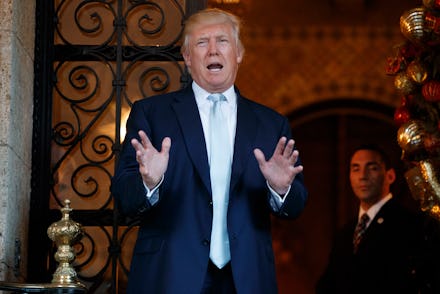Trump's America already looks like an African kleptocracy

Here's a story that may sound familiar: A leader soars to power on a populist message; his party calls him the "people's candidate." He promises to bring prosperity to the poor, vilifying immigrants in the process. Yet once in power, he amasses extraordinary wealth for himself. He hands over the country's largest state-owned oil company to his daughter, who becomes the richest woman in Africa as he gets challenged in court for nepotism.
I'm talking about José Eduardo dos Santos, who has ruled Angola for 37 years by silencing critics while racking up a fortune for himself and his family. But I could easily be describing any number of Africa's corrupt leaders — Robert Mugabe in Zimbabwe, for instance, or Omar al-Bashir in Sudan — who rule on bribery, cronyism, nepotism and embezzlement.
"It's going to be hard to speak with moral authority on corruption and on nepotism because visually, it's clear that there is nepotism and corruption in the Trump camp."
For decades, America has pressured dictators in Africa to embrace democracy and the rule of law. Now, the joke's on us. With a couple weeks until inauguration, Donald Trump is already drawing from a similar playbook.
Two aid workers and two U.S. diplomats working in Africa and the Middle East who spoke on condition of anonymity to protect their jobs said Trump's behavior is making their jobs more difficult. At least two sources said their meetings have been more contentious since the election, with foreign counterparts asking why they should embrace democracy if Trump himself doesn't play by the rules.
"It's going to be hard to speak with moral authority on corruption and on nepotism because visually, it's clear that there is nepotism and corruption in the Trump camp," said Shadi Hamid, senior fellow at the Brookings Institution and author of Islamic Exceptionalism: How the Struggle Over Islam is Reshaping the World. "His children are very involved in business, but also are advising him on policy."
One issue is Trump's failure to disentangle himself from his unprecedented conflicts of interest. Initially, Trump tweeted that he would be "leaving [his] businesses before January 20" to "focus full time on the presidency."
It's now clear he does not plan to divest from his businesses and put his stake in a blind trust, even though presidents from both parties have done so for four decades. Trump says his sons Donald Trump, Jr. and Eric Trump will take over the family business in his stead. Yet they, along with his daughter Ivanka Trump and her husband, Jared Kushner, have been intimately involved in transition meetings. In one case, the New York Times reported Ivanka Trump closed a business deal with a Japanese clothing company while she sat in on her father's recent meeting with Japanese Prime Minister Shinzo Abe. The Japanese government is the largest investor in the company.
This kind of behavior has been the hallmark of African kleptocracies for decades. President Robert Mugabe in Zimbabwe, for example, appointed his son-in-law to run the country's largest national airline.
Yet Trump has dismissed concerns about his personal conflicts of interest (or those of his proposed cabinet members like CEO of Exxon Rex Tillerson). "You people are making that a big deal — the business," the president-elect recently told the press outside Mar-a-Lago. "It is a very routine thing. It is not a big deal."
Then there's the issue of pay-for-play — offering services in exchange for money — which is another favorite practice of African kleptocrats. The Emoluments Clause of the Constitution prohibits presidents from receiving gifts from foreign governments without approval from Congress.
But foreign officials are already trying to win over Trump by doing him favors. The embassy of Kuwait moved an expensive event to Trump's D.C. hotel after pressure from his transition team. Trump's decade-long trademark dispute with China got resolved in his favor just several days after he was elected president. Even before election night, Philippines President Rodrigo Duterte appointed a new trade envoy to the U.S. who happened to be Trump's business partner in Manila.
"That hasn't been possible in the U.S.," said Ian Bremmer, a political scientist and president of the Eurasia Group, a political consulting firm. "But now, other governments and corporate leaders will think that the way they can work best with the U.S. government is by throwing something to the Trump organization."
The irony, of course, is that this is exactly the kind of corruption that Trump attacked Hillary Clinton for over the course of the election, when he slammed her for engaging in pay-for-play with Clinton Foundation donors as Secretary of State.
The United States' ability to project democracy across the world has been on the decline for decades. And yet, countries still look to America for leadership. What the U.S. says and how it acts on the global stage carries weight. As President Barack Obama recently cautioned in his final press conference of 2016, America is a much stronger country than Russia, but "they can impact us if we lose track of who we are, if we abandon our values."
This is almost certain to happen under President Donald Trump. "The U.S. is no longer going to be seen as the voice for liberal democracy," Hamid said. "Now, the U.S. may be seen as promoting illiberal democracy abroad."
Opposition to Trump's conflicts will not come from this Republican-controlled Congress. On Tuesday, House Republicans secretly voted to weaken the Office of Congressional Ethics, which investigates corruption allegations against members of Congress. After a vociferous backlash, they reversed course.
What's clear from the episode is the only way to rein in Trump will be everyday citizens speaking up.